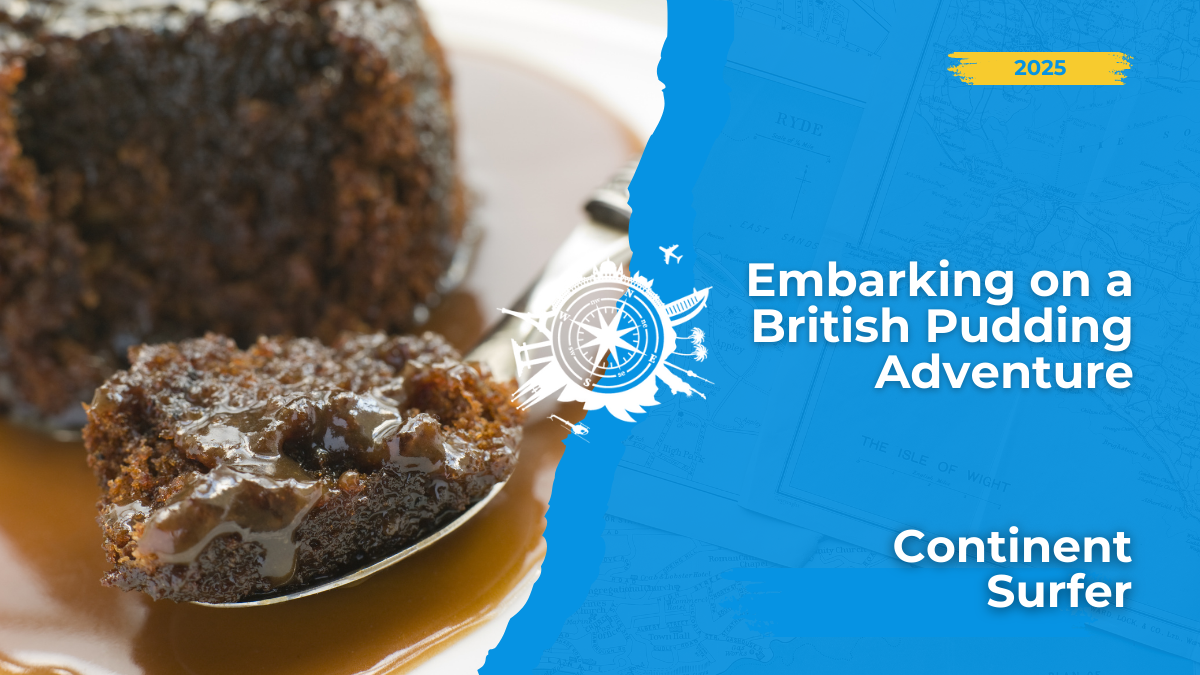Embarking on a British Pudding Adventure
Hey there, food explorers! Are you ready to dive into the mysterious world of British puddings? Buckle up, because we’re about to unravel some seriously delicious secrets that will leave your taste buds tingling.
written by: Ildi – Continent Surfer
In the United Kingdom, puddings are like the chameleons of the culinary scene – they can be sweet or savoury, boiled or steamed, and they might even surprise you by popping up in the most unexpected places! Imagine having a black pudding for breakfast? Yup, it’s a thing!
What exactly qualifies as a pudding?
In the UK, the term “pudding” is casually tossed around to denote desserts or afters. However, the plot thickens when we explore deeper – certain dishes earn the prestigious title of “authentic puddings.”
Well, picture this: anything that’s cooked in a dish, cloth, or even something as daring as intestines (yep, you read that right!) can be considered a pudding. From beloved Christmas puddings to luscious suet puddings and heavenly sponge puddings taking centre stage.
From the hearty black pudding to the intricate steak & kidney pudding, these are the crown jewels of British culinary artistry. Oh, and let’s not forget haggis – a fellow member of this exclusive club!

There’s a curveball
Yorkshire puddings! Unlike their boiled counterparts, these little wonders are baked to perfection right beneath a roast beef in the oven. A truly ingenious twist, right?
Now, let’s talk about the puzzling puddings that don’t quite fit the mould. There are dishes that are called pudding, but they are not exactly puddings!
We’re talking about the likes of bread and butter pudding, sticky toffee pudding, and Eve’s pudding. Why aren’t they just called bread and butter pie or toffee cake, you ask? It’s like there’s a playful riddle hiding in every scrumptious bite.
What was the first pudding?
The pudding is a descendant of the dumpling. This was the claim made in 1726 by Thomas Gordon and Henry Carey. They said that dumplings became larger and larger that they had to be tied up in a cloth, thus creating the pudding. Hello pudding!
Yet, in Elizabeth Raffald’s 1769 cookbook, there are ample recipes for large dumplings that required a cloth. Strangely, she still called them dumplings.
So, as you savour your next pudding adventure – whether it’s an authentic-boiled classic or an enchanting outlier – remember that these culinary treasures weave a tapestry of British flavours and heritage. Stay tuned, as the pudding saga unfolds with tales yet to be told!
Let the history behind it tickle your imagination. It’s not just food; it’s a journey through time and flavour that’s bound to make every bite even more delightful.
Here’s to some mouthwatering pudding adventures – bon appétit!

In today’s fast-paced world, it’s good to have someone you can count on!
Whether you’re preparing to move to the UK, have been living here for a while, are thinking of moving to another country or are stuck, we have a wide range of experience.
Did you know?
The traditional Christmas pudding dessert was originally made from minced meat of various animals. It was considered a royal feast, crafted from the minced meat of pheasant, partridge, rabbit, and poultry, and shaped like a dome, matured over a long period. In 1714, by the decision of King George, it was made with dried fruits instead of meat, and it became the centrepiece of the Christmas table, crowning the royal feast with its sweet and spicy flavours. This tradition remains to this day, usually before serving, it’s drenched in brandy, which is then set on fire for the guests to admire the blue flames.
Sources:

Like what we do?
If so, please support us, every little counts and is much appreciated!
You will help us to come up with useful information regularly, so please support us every once in a while or even monthly! Thank you!
Join the Continent Surfer community!
Subscribe to our newsletter and be the first to receive the latest news, useful tips, and exclusive offers!
Comment

